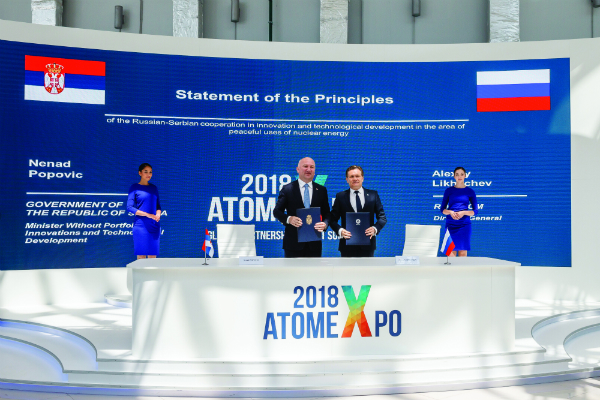Will there be a new Israel in the Balkans – an unrecognized nuclear state created with the help of Russia, bypassing the nuclear non-proliferation regime? Of course, we are talking about the main conduits of Moscow’s policy in the Balkans – the Serbs. As for their movements in a direction that allows us to discuss such a possibility, we will start with the results of the elections in Bosnia and Herzegovina (BiH), which are directly related to this issue.
So, we have already written that before the elections, Vladimir Putin suddenly met with Milorad Dodik, the head of the so-called Republic of Srpska, in Sochi (and a day later in Moscow – with Aleksandar Vučić) and wished him victory in the elections for the collective presidency of BiH. In other words, Moscow openly supported a politician who promised to put an end to the state in which he was elected co-president, in order to unite the Republic of Srpska BiH and Serbia into one state in this century. Milorad Dodik won the elections for the co-presidency of BiH from the Serbs, receiving 53.79% of the votes, and his successor, Željka Cvijanović, will lead the so-called Republic of Srpska BiH after him, receiving the highest number of votes in the elections for its head – 47.53%.
This is good news for Moscow, which has been waiting for this victory, and bad news for BiH, whose unacknowledged enemies are Cvijanović and Dodik. However, Dodik will have fewer opportunities than he had hoped to use the legal instruments of the joint presidency to shake BiH. The point is that the co-president from the second nation – the Croats, with whom the Serb chauvinists planned to confront the Bosniaks, unexpectedly chose not Dodik’s ally – Dragan Čović, but a convinced Bosnian patriot – Željko Komšić.
Komšić won 52.83% of the vote, well ahead of Čović, who received only 35.74%. But according to Croatian nationalists, he managed to do this thanks to the votes of those Bosniaks who systematically voted for candidates for the collective presidency not from their Bosniak people but from the foreign Croat people in order to push through the candidate they needed. on this basis, supporters of Čović and Croatia behind him claim that Komšić does not represent the Croats and that the Croats need their own republic that would protect them from Bosniak hegemony. But they have no legal means to achieve this without violating the Dayton Peace Agreement guaranteed by the international community. As a result, Komšić, a Bosnian patriot and ally of the Bosniaks, will represent the Croats, and not Čović, an agent of Croatian influence and a supporter of the separation of the Croats.
Another hope that did not come true for Moscow, Belgrade and Dodik was the election of the collective presidency of Bosnia and Herzegovina by the Bosniak people themselves. Muslim patriots from the party of the father and founder of independent BiH – Alija Izetbegović were opposed by the heirs of Yugoslav communist internationalists in the person of Denis Bećirović and the pro-Serbian oligarch Fahrudin Radončić. They received 33.67% and 12.89% of the votes, respectively, and lost to the candidate of the Muslim Patriots, Šefik Džaferović, who received 36.89% of the votes and occupied the position of co-president of BiH from the Bosniak people (elections in BiH are held in one round).
It is significant that both Džaferović and Komšić, who will represent the interests of BiH in the co-presidency, are opposed to the separatist Dodik, a legendary participant in the war in the 1990s. Džaferović headed the military counterintelligence of the BiH army, and Komšić is a knight of the highest military award – the Order of the Golden Lily.
Such combat experience and the patriotic attitude of BiH patriots to confront their enemies will be very appropriate. Especially in the light of the election of a pro-Bosniak candidate as co-president by the Croats, the separatists will be forced either to moderate their ambitions or to act outside the law.
And here it is appropriate to return to where this article began. Recently, in parallel with the preparations for the elections in Bosnia and Herzegovina, the head of the state corporation “Rosatom”, Alexey Likhachev, invited specialists from Serbia to participate in a project for another nuclear reactor to be built in Russia. Two months earlier, the same Rosatom signed a cooperation agreement with the Ministry of Innovation of Serbia, represented by its head Nenad Popovic.
Of course, both sides claim that this cooperation is purely peaceful. In particular, according to the Serbian side, it is necessary to solve the problems of energy shortage and active use of nuclear technologies in medicine and agro-industry. However, we should not forget that at the same time Serbs – both from Serbia and from the Republika Srpska in Bosnia and Herzegovina – went to Moscow for weapons and received contracts for them, and instructors from Russian private military companies openly trained Serb fighters who openly declared that they were preparing for a new war in Bosnia and Herzegovina.
If we add to this the pre-war state of relations between Serbia and Kosovo and the provocative statements of the Russian ambassador on this matter, cooperation between Moscow and Belgrade in the nuclear sphere at least raises serious questions. After all, the Kremlin has already been accused of supplying nuclear technology to the mad regime of North Korea, and right now Moscow is openly supplying the S-300 complexes to the Assad regime. In this context, can we be sure that Serbia will not suddenly become an unrecognized nuclear state as part of the preparations for a possible redrawing of borders in the Balkans with the help of weapons?

